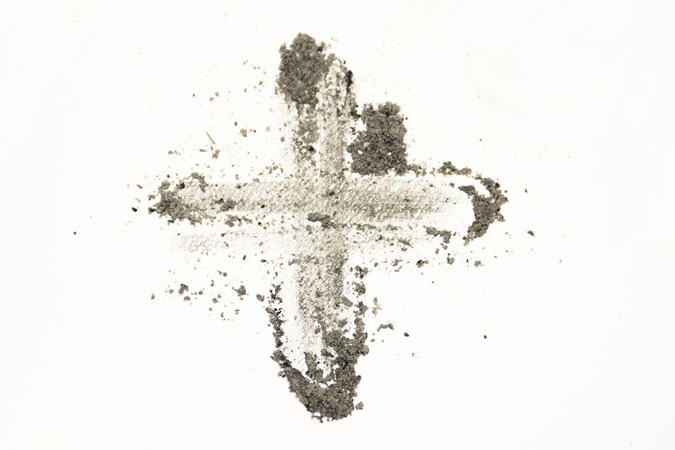
Receiving ashes on Ash Wednesday is often misunderstood as simply a reminder of our mortality: “We’re all gonna die!” What a depressing message! And yet, the words we hear at Mass on Ash Wednesday remind us that being marked with ashes will help us to “celebrate” the Paschal Mystery. To celebrate is to express joy. What is so joyful about getting dust smeared on our foreheads?
We need to remember that all symbolic acts invoke a narrative. The act of being marked with ashes invokes the narrative of the Creation story, when God breathed life into the dust of the earth and formed man and woman. God and dirt (soil) enjoy an intimate relationship. In fact, our Amish brothers and sisters are known to say that, “You’re never closer to God than when you’re working with soil.” So the first thing that receiving ashes reminds us of is our intimacy with God. To be told that we are dust and to dust we shall return is to remind us that we come from God and will return to God—that God is our origin and destiny. To be smeared with ashes is to be reminded of just how near God is to us. When we are marked with ashes, it is God’s way of rubbing off on us. In other words, ashes are a symbol of God’s grace, invoking the same intimate relationship that is expressed by the pouring of holy water in Baptism. It’s just another way of God proclaiming to each of us that, “You are mine!”
The narrative that begins in Genesis and weaves its way through the Old Testament is always closely tied to dirt (soil), because God continually promises to provide his people with land—not just property, but soil—on which to grow food and thus, to prosper. To receive ashes is to be reminded of the sacredness of our earth from which we come and to which we shall return. In his encyclical Laudato Si’, Pope Francis eloquently reminds us that, “The entire material universe speaks of God’s love, his boundless affection for us. Soil, water, mountains: everything is, as it were, a caress of God.” (84) To be marked with ashes is to be reminded of this “caress of God” that comes to us through the natural world and to respond with loving care for all of creation.
Finally, in the narrative of the Old Testament, God links possession of the land to justice. God granted human beings dominion (stewardship) over creation, but God did not grant humans sovereignty (control). Dirt (soil) is the means by which people are fed and nourished. Therefore, distribution of dirt (and that which grows from the dirt) is to be equitable. In Leviticus 25:23, God states bluntly, “The land is mine; with me you are but aliens and tenants.” Throughout the Old Testament, it is made clear that possession of the land and its fruits was conditional upon holiness manifested through justice. For example, Jeremiah states, “For if you truly amend your ways and your deeds, if you truly execute justice one with another, if you do not oppress the sojourner, the fatherless, or the widow, or shed innocent blood in this place, and if you do not go after other gods to your own harm, then I will let you dwell in this place, in the land that I gave of old to your fathers forever.” (Jeremiah 7:5–7) To be marked with ashes is to be reminded of our call to justice.
So, having our foreheads smeared with dirt on Ash Wednesday is a reminder of three very powerful things: God’s grace (nearness), the goodness of all creation, and our call to share the abundance of all creation equitably.
That’s some fertile dirt we’ll be sporting on our foreheads.





Be the first to comment